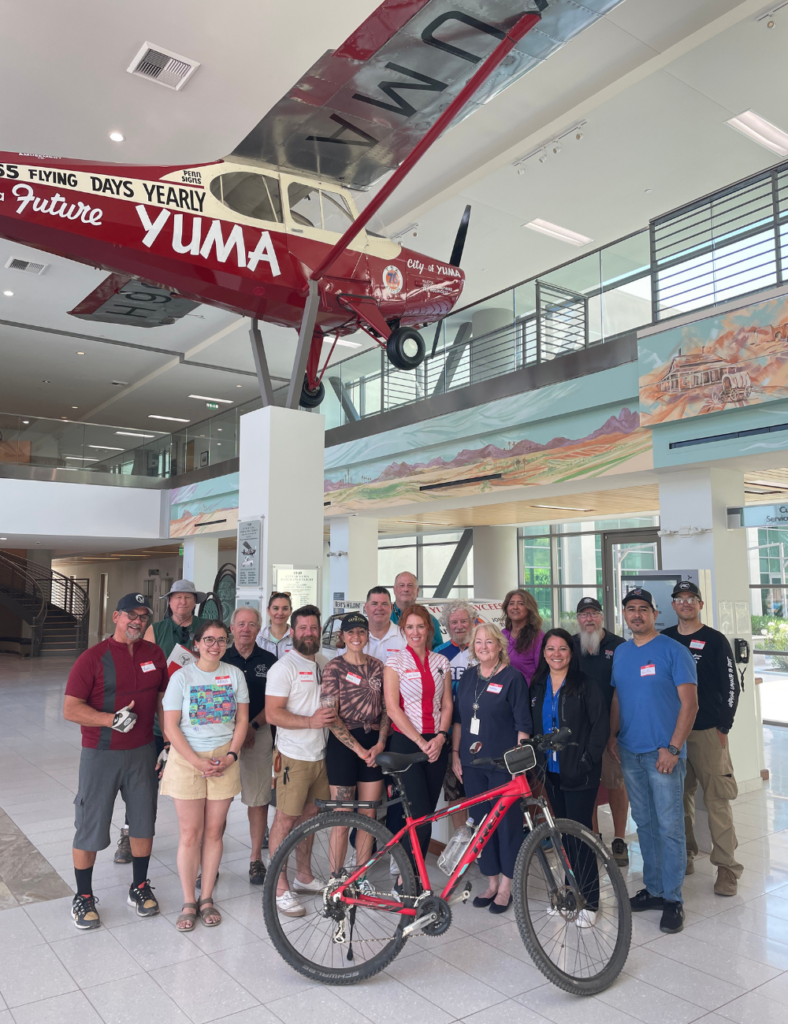DISCOVER YOUR LOCAL BICYCLING COMMUNITY
Find local advocacy groups, bike shops, instructors, clubs, classes and more!
2023 Recap: Bicycle Friendly Community Workshops
Over the spring and summer of 2023, the League led the second year of our Bicycle Friendly Community (BFC) Workshops. Our Bicycle Friendly America Program Specialist, Anna Tang, traveled across the country to help local leaders and advocates assess their current work around biking and strategize how to achieve their vision for success. Each BFC Workshop took a deep dive into benchmarking the community’s progress to date, offered concrete solutions to their issues, and provided a holistic view of how to strengthen and grow the community’s bicycling efforts through an equity lens. Each workshop also included a bike audit (you can conduct one in your community! Check out our free workbook »)

The communities selected this year were Yuma and Chandler, AZ, Rancho Cucamonga, CA, Bowling Green, KY, Brandon, MS, Euclid, OH, and Arlington, TX. As we look back on the successes of 2023, we caught up with Anna to hear about her whirlwind tour across the nation.
What was it like to travel all over the country doing these workshops?

My travel started in April and ended in August nearly three dozen flights later. Over the summer, I traveled to over six states and seven communities – encompassing a mix of extremely arid climates to more lush, mountainous regions. I had been to a lot of these states before, but it was my first time visiting the state of Mississippi! Overall, it was a great experience. Meeting a range of wonderful people who all had incredibly insightful experiences into what would make their communities better for biking and overall better places to live was refreshing and energizing. I also loved being able to see some local projects in the context of each community’s perspective and hear about future endeavors. The traveling left me exhausted in the best possible way and looking forward to next year’s adventures.
The workshop is described as a hands-on needs assessment where you identify a community’s strengths, weaknesses, goals, solutions, etc. Did you find that a lot of communities had similar challenges, or were they all different?
Most communities shared a lot of similar challenges. The most common issues identified were the need to have connected on-street bike networks and more on-bike learning opportunities for both youth and adults – especially bike education for school-age kids. Constant themes throughout the sessions also included more regular events that normalize bicycling and encourage the community to bike, as well as the need for better and more bike parking.
The good thing about these common needs is that they are realistically feasible to find solutions for, and once implemented these solutions will make a big impact. The last similarity I will mention is enthusiasm. Each community clearly has a deep desire to bring about the best results for their area, and the drive and integrity to make it happen runs strongly throughout every place I visited.
What were some of your favorite conversations throughout the workshop series?
I’m a big nerd so my favorite conversations were talking to folks about the intricate details of how the local city or larger government entities have found creative ways to use funding that isn’t necessarily allocated for biking/walking projects – such as in school zones or other similar areas that have broader and more flexible funding opportunities and uses. I also enjoy talking to people about their trail projects and advocacy efforts. One of my most memorable conversations was with two high-school students who attended the workshop in Ohio — they were thrilled to learn about how to get to the local bike park! The good thing about the workshops is that each community set up ways to continue the conversation, so it wasn’t truly saying goodbye when I had to leave.
How did the bike rides compare across the country?

The bike rides – which also functioned as mini bike audits to assess a small section of a community’s bikeability – were all very similar, although the number of people who joined for the ride varied a lot by each community. It seemed like the lowest attended bike rides were in communities that had the most work to do to build comfortable, safe, and connected networks.
Many attendees said that the bike ride was their favorite, if not, the most eye-opening part of the workshop. Not a surprise there!
Were you able to offer assistance that directly resulted in a success story for a community?
In Yuma, AZ, I was able to connect the local workshop group with our deputy executive director Caron and the Intersections Initiative team to help them learn more about federal funding opportunities. Specifically, I mentioned the SS4A grant (Safe Streets and Roads for All) and they ended up applying for it and winning some grant funds! It will help them build some of their bike networks and make their streets safer for all roadway users. Most, if not all, of the other communities have since begun to meet regularly and have put on group bike rides, formed bike subcommittees, and have plans to come to the 2024 National Bike Summit in Washington, DC!
In 2024, we’re excited to continue the work of providing Bicycle Friendly Workshops across the United States. We will be traveling to Memphis, TN, Wentzville, MO, and Roswell, GA for the next round of BFC Workshops. Want to host one in your community? Reach out to us for more information on how to bring the League to do a workshop for your community! Email [email protected] to learn more.